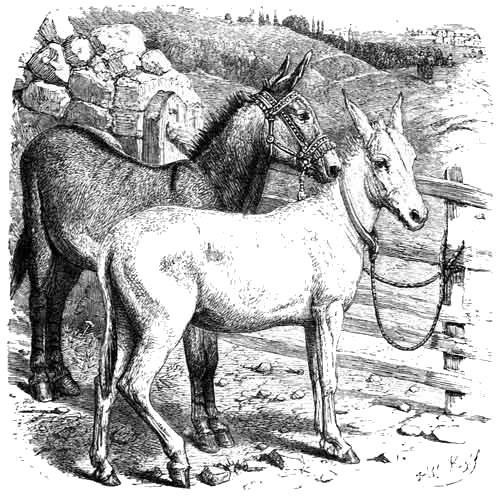 полная версия
полная версияBible Animals
And lastly, the woman of Shunem, who rode on an Ass to meet Elisha, engaged in a mission in which the life of her only child was involved, was a woman of great wealth (2 Kings iv. 8), who was able not only to receive the prophet, but to build a chamber, and furnish it for him.
Not to multiply examples, we see from these passages that the Ass of the East was held in comparatively high estimation, being used for the purposes of the saddle, just as would a high-bred horse among ourselves.
Consequently, the Ass is really a different animal. In this country he is repressed, and seldom has an opportunity for displaying the intellectual powers which he possesses, and which are of a much higher order than is generally imagined. It is rather remarkable, that when we wish to speak slightingly of intellect we liken the individual to an Ass or a goose, not knowing that we have selected just the quadruped and the bird which are least worthy of such a distinction.
Putting aside the bird, as being at present out of place, we shall find that the Ass is one of the cleverest of our domesticated animals. We are apt to speak of the horse with a sort of reverence, and of the Ass with contemptuous pity, not knowing that, of the two animals, the Ass is by far the superior in point of intellect. It has been well remarked by a keen observer of nature, that if four or five horses are in a field, together with one Ass, and there be an assailable point in the fence, the Ass is sure to be the animal that discovers it, and leads the way through it.

SYRIAN ASSES.
"A bridle for the ass."—Prov. xxvi.
Take even one of our own toil-worn animals, turned out in a common to graze, and see the ingenuity which it displays when persecuted by the idle boys who generally frequent such places, and who try to ride every beast that is within their reach. It seems to divine at once the object of the boy as he steals up to it, and he takes a pleasure in baffling him just as he fancies that he has succeeded in his attempt.
Should the Ass be kindly treated, there is not an animal that proves more docile, or even affectionate. Stripes and kicks it resents, and sets itself distinctly against them; and, being nothing but a slave, it follows the slavish principle of doing no work that it can possibly avoid.
Now, in the East the Ass takes so much higher rank than our own animal, that its whole demeanour and gait are different from those displayed by the generality of its brethren in England. "Why, the very slave of slaves," writes Mr. Lowth, in his "Wanderer in Arabia," "the crushed and grief-stricken, is so no more in Egypt: the battered drudge has become the willing servant. Is that active little fellow, who, with race-horse coat and full flanks, moves under his rider with the light step and the action of a pony—is he the same animal as that starved and head-bowed object of the North, subject for all pity and cruelty, and clothed with rags and insult?
"Look at him now. On he goes, rapid and free, with his small head well up, and as gay as a crimson saddle and a bridle of light chains and red leather can make him. It was a gladdening sight to see the unfortunate as a new animal in Egypt."
Hardy animal as is the Ass, it is not well adapted for tolerance of cold, and seems to degenerate in size, strength, speed, and spirit in proportion as the climate becomes colder. Whether it might equal the horse in its endurance of cold provided that it were as carefully treated, is perhaps a doubtful point; but it is a well-known fact that the horse does not necessarily degenerate by moving towards a colder climate, though the Ass has always been found to do so.
There is, of course, a variety in the treatment which the Ass receives even in the East. Signor Pierotti, whose work on the customs and traditions of Palestine has already been mentioned, writes in very glowing terms of the animal. He states that he formed a very high opinion of the Ass while he was in Egypt, not only from its spirited aspect and its speed, but because it was employed even by the Viceroy and the great Court officers, who may be said to use Asses of more or less intelligence for every occasion. He even goes so far as to say that, if all the Asses were taken away from Egypt, not a man would be left.
The same traveller gives an admirable summary of the character of the Ass, as it exists in Egypt and Palestine. "What, then, are the characteristics of the ass? Much the same as those which adorn it in other parts of the East—namely, it is useful for riding and for carrying burdens; it is sensible of kindness, and shows gratitude; it is very steady, and is larger, stronger, and more tractable than its European congener; its pace is easy and pleasant; and it will shrink from no labour, if only its poor daily feed of straw and barley is fairly given.
"If well and liberally supplied, it is capable of any enterprise, and wears an altered and dignified mien, apparently forgetful of its extraction, except when undeservedly beaten by its masters, who, however, are not so much to be blamed, because, having learned to live among sticks, thongs, and rods, they follow the same system of education with their miserable dependants.
"The wealthy feed him well, deck him with fine harness and silver trappings, and cover him, when his work is done, with rich Persian carpets. The poor do the best they can for him, steal for his benefit, give him a corner at their fireside, and in cold weather sleep with him for more warmth. In Palestine, all the rich men, whether monarchs or chiefs of villages, possess a number of asses, keeping them with their flocks, like the patriarchs of old. No one can travel in that country, and observe how the ass is employed for all purposes, without being struck with the exactness with which the Arabs retain the Hebrew customs."
The result of this treatment is, that the Eastern Ass is an enduring and tolerably swift animal, vying with the camel itself in its powers of long-continued travel, its usual pace being a sort of easy canter. On rough ground, or up an ascent, it is said even to gain on the horse, probably because its little sharp hoofs give it a firm footing where the larger hoof of the horse is liable to slip.
The familiar term "saddling the Ass" requires some little explanation.
The saddle is not in the least like the article which we know by that name, but is very large and complicated in structure. Over the animal's back is first spread a cloth, made of thick woollen stuff, and folded several times. The saddle itself is a very thick pad of straw, covered with carpet, and flat at the top, instead of being rounded as is the case with our saddles. The pommel is very high, and when the rider is seated on it, he is perched high above the back of the animal. Over the saddle is thrown a cloth or carpet, always of bright colours, and varying in costliness of material and ornament according to the wealth of the possessor. It is mostly edged with a fringe and tassels.
The bridle is decorated, like that of the horse, with bells, embroidery, tassels, shells, and other ornaments. An example of the headstall worn by an Ass belonging to a wealthy man may be seen in the illustration.
As we may see from 2 Kings iv. 24, the Ass was generally guided by a driver who ran behind it, just as is the custom with the hired Asses in this country. Owing to the unchanging character of the East, there is no doubt that the "riders on asses" of the Scriptures rode exactly after the mode which is adopted at the present day. What that mode is, we may learn from Mr. Bayard Taylor's amusing and vivid description of a ride through the streets of Cairo:—
"To see Cairo thoroughly, one must first accustom himself to the ways of these long-eared cabs, without the use of which I would advise no one to trust himself in the bazaars. Donkey-riding is universal, and no one thinks of going beyond the Frank quarters on foot. If he does, he must submit to be followed by not less than six donkeys with their drivers. A friend of mine who was attended by such a cavalcade for two hours, was obliged to yield at last, and made no second attempt. When we first appeared in the gateway of an hotel, equipped for an excursion, the rush of men and animals was so great that we were forced to retreat until our servant and the porter whipped us a path through the yelling and braying mob. After one or two trials I found an intelligent Arab boy named Kish, who for five piastres a day furnished strong and ambitious donkeys, which he kept ready at the door from morning till night. The other drivers respected Kish's privilege, and henceforth I had no trouble.
"The donkeys are so small that my feet nearly touched the ground, but there is no end to their strength and endurance. Their gait, whether in pace or in gallop, is so easy and light that fatigue is impossible. The drivers take great pride in having high-cushioned red saddles, and in hanging bits of jingling brass to the bridles. They keep their donkeys close shorn, and frequently beautify them by painting them various colours. The first animal I rode had legs barred like a zebra's, and my friend's rejoiced in purple flanks and a yellow belly. The drivers ran behind them with a short stick, punching them from time to time, or giving them a sharp pinch on the rump. Very few of them own their donkeys, and I understood their pertinacity when I learned that they frequently received a beating on returning home empty-handed.
"The passage of the bazaars seems at first quite as hazardous on donkey-back as on foot; but it is the difference between knocking somebody down and being knocked down yourself, and one certainly prefers the former alternative. There is no use in attempting to guide the donkey, for he won't be guided. The driver shouts behind, and you are dashed at full speed into a confusion of other donkeys, camels, horses, carts, water-carriers, and footmen. In vain you cry out 'Bess' (enough), 'Piacco,' and other desperate adjurations; the driver's only reply is: 'Let the bridle hang loose!' You dodge your head under a camel-load of planks; your leg brushes the wheel of a dust-cart; you strike a fat Turk plump in the back; you miraculously escape upsetting a fruit-stand; you scatter a company of spectral, white-masked women; and at last reach some more quiet street, with the sensations of a man who has stormed a battery.
"At first this sort of riding made me very nervous, but presently I let the donkey go his own way, and took a curious interest in seeing how near a chance I ran of striking or being struck. Sometimes there seemed no hope of avoiding a violent collision; but, by a series of the most remarkable dodges, he generally carried you through in safety. The cries of the driver running behind gave me no little amusement. 'The hawadji comes! Take care on the right hand! Take care on the left hand! O man, take care! O maiden, take care! O boy, get out of the way! The hawadji comes!' Kish had strong lungs, and his donkey would let nothing pass him; and so wherever we went we contributed our full share to the universal noise and confusion."
This description explains several allusions which are made in the Scriptures to treading down the enemies in the streets, and to the chariots raging and jostling against each other in the ways.
The Ass was used in the olden time for carrying burdens, as it is at present, and, in all probability, carried them in the same way. Sacks and bundles are tied firmly to the pack-saddle; but poles, planks, and objects of similar shape are tied in a sloping direction on the side of the saddle, the longer ends trailing on the ground, and the shorter projecting at either side of the animal's head. The North American Indians carry the poles of their huts, or wigwams, in precisely the same way, tying them on either side of their horses, and making them into rude sledges, upon which are fastened the skins that form the walls of their huts. The same system of carriage is also found among the Esquimaux, and the hunters of the extreme North, who harness their dogs in precisely the same manner. The Ass, thus laden, becomes a very unpleasant passenger through the narrow and crowded streets of an Oriental city; and many an unwary traveller has found reason to remember the description of Issachar as the strong Ass between two burdens.
The Ass was also used for agriculture, and was employed in the plough, as we find from many passages. See for example, "Blessed are ye that sow beside all waters, that send forth thither the feet of the ox and the ass" (Isa. xxxii. 20). Sowing beside the waters is a custom that still prevails in all hot countries, the margins of rivers being tilled, while outside this cultivated belt there is nothing but desert ground.
The ox and the Ass were used in the first place for irrigation, turning the machines by which water was lifted from the river, and poured into the trenches which conveyed it to all parts of the tilled land. If, as is nearly certain, the rude machinery of the East is at the present day identical with those which were used in the old Scriptural times, they were yoked to the machine in rather an ingenious manner. The machine consists of an upright pivot, and to it is attached the horizontal pole to which the ox or Ass is harnessed. A machine exactly similar in principle may be seen in almost any brick-field in England; but the ingenious part of the Eastern water-machine is the mode in which the animal is made to believe that it is being driven by its keeper, whereas the man in question might be at a distance, or fast asleep.
The animal is first blindfolded, and then yoked to the end of the horizontal bar. Fixed to the pivot, and rather in front of the bar, is one end of a slight and elastic strip of wood. The projecting end, being drawn forward and tied to the bridle of the animal, keeps up a continual pull, and makes the blinded animal believe that it is being drawn forward by the hand of a driver. Some ingenious but lazy attendants have even invented a sort of self-acting whip, i.e. a stick which is lifted and allowed to fall on the animal's back by the action of the wheel once every round.
The field being properly supplied with water, the Ass is used for ploughing it. It is worthy of mention that at the present day the prohibition against yoking an ox and an Ass together is often disregarded. The practice, however, is not a judicious one, as the slow and heavy ox does not act well with the lighter and more active animal, and, moreover, is apt to butt at its companion with its horns in order to stimulate it to do more than its fair proportion of the work.
That the Ass was put to a similar use in turning the large millstones may be seen from Matt. xviii. 6. In the Authorized Version, the passage is rendered thus: "But whoso shall offend one of these little ones which believe in Me, it were better for him that a millstone were hanged about his neck, and that he were drowned in the depth of the sea."
Now if we turn to the Greek Testament we find that the passage reads rather differently, a force being giving to it which it does not possess in the translation: "But whosoever shall scandalize [i.e. be a stumbling-block to] one of these little ones that believe in Me, it were better for him that an ass's millstone were hung about his neck, and he were sunk in the depth of the sea." The chief force of this saying lies in the word which is omitted in our translation. Our Lord specially selected the Ass's millstone on account of its size and weight, in contradistinction to the ordinary millstone, which was turned backwards and forwards by the hands of women.
There is a custom now in Palestine which probably existed in the days of the Scriptures, though I have not been able to find any reference to it. Whenever an Ass is disobedient and strays from its master, the man who captures the trespasser on his grounds clips a piece out of its ear before he returns it to its owner. Each time that the animal is caught on forbidden grounds it receives a fresh clip of the ear. By looking at the ears of an Ass, therefore, any one can tell whether it has ever been a straggler; and if so, he knows the number of times that it has strayed, by merely counting the clip-marks, which always begin at the tip of the ear, and extend along the edges. Any Ass, no matter how handsome it may be, that has many of those clips, is always rejected by experienced travellers, as it is sure to be a dull as well as a disobedient beast.
Signor Pierotti remarks that if the owners of the Asses were treated similarly for similar offences, the greater number would be marked as soon as they begin to walk, and of the adults there would be scarcely one who had any ear on his head.
The Ass being so universally useful, we need not be surprised at the prominence which it takes in the Scriptural narrative, and the frequency with which its name occurs. The wealthy personages of the olden time seemed to have esteemed the Ass as highly as the camel, the ox, the sheep, or the goat. Abraham, for example, is described as being a rich man, and possessing "sheep, and oxen, and he-asses, and men-servants, and maid-servants, and she-asses, and camels" (Gen. xii. 16). In a succeeding chapter (xxx. 43) the prosperity of Jacob is mentioned in almost exactly the same terms.
So, before Job's trials came upon him, "his substance was seven thousand sheep, and three thousand camels, and five hundred yoke of oxen [i.e. 1,000], and five hundred she-asses, and a very great household; so that this man was the greatest of all the men of the east" (Job i. 3). And after his trials, when his wealth was restored to him twofold, the thousand she-asses are mentioned as prominently as the thousand yoke of oxen.
That the care of the Asses was an honourable post we learn from several passages. Take for example Gen. xxxvi. 24: "And these are the children of Zibeon; both Ajah, and Anah: this was that Anah that found the mules in the wilderness, as he fed the asses of Zibeon his father." The charge of the Asses was, as the reader must see, a post of sufficient honour and importance to be trusted to the son of the owner. A similar case is recorded in the well-known instance of Saul, whose father had lost his herd of Asses, and who at once sent his son upon the important mission of recovering them. And it was during the fulfilment of this mission that he was anointed the first king of Israel.
Later in the sacred history we find that when David consolidated his power, and organized the affairs of his new kingdom, he divided the people in general, the army, the land, the produce, and the cattle, into departments, and appointed over each department some eminent man whose name is carefully given. After mentioning that the people and the army were divided into "courses," and that certain officers were set over each course, the sacred historian proceeds to state that one officer was appointed as overseer of the treasury, another of the granaries, another of the field-labourers, another over the vineyards, and so forth. He then mentions that even the cattle were divided into their several departments, the care of the hill-cattle being given to one man, and of the cattle of the plain to another, of the camels to a third, and of the Asses to a fourth.
It is scarcely necessary to mention that the flesh of the Ass was forbidden to the Jews, because the animal neither chewed the cud nor divided the hoof. How repulsive to them must have been the flesh of the Ass we may infer from the terrible description of the siege of Samaria by Benhadad. The sacred historian describes with painful fidelity the horrors of the siege, and of the dreadful extremity to which the people were reduced. No circumstance could be more terrible than the quarrel between the two mothers, who had mutually agreed to kill and eat their children, and yet on a par with that dreadful statement is mentioned the fact that even the flesh of the Ass was eaten, and that an Ass's head cost eighty pieces of silver.
Whether the milk of the she Ass were used or not is rather a doubtful point, but, in all probability, the milk was considered as lawful food, though the flesh might not be eaten.
As to the legends respecting the Ass, they are innumerable, and I shall only mention one or two of them.
The first is an old Rabbinical legend respecting the Flood and the admission of the creatures into the ark. It appears that no being could enter the ark unless specially invited to do so by Noah. Now when the Flood came, and overwhelmed the world, the devil, who was at that time wandering upon the earth, saw that he was about to be cut off from contact from mankind, and that his dominion would be for ever gone. The ark being at last completed, and the beasts called to enter it in their proper order, the turn of the Ass came in due course.
Unfortunately for the welfare of mankind, the Ass was taken with a fit of obstinacy, and refused to enter the vessel according to orders. After wasting much time over the obstinate animal, Noah at last lost patience, and struck the Ass sharply, crying at the same time to it, "Enter, thou devil!" Of course the invitation was at once accepted, the devil entered the ark, and on the subsiding of the water issued out to take his place in the newly begun world.
Since the Christian era, many curious legends have sprung up respecting the Ass. One of the most familiar of these legends refers to the black stripe along the spine and the cross-bar over the shoulder. This black cross is really believed by many persons to have been given to the animal in consequence of its connexion with our Lord. I need hardly tell the reader that it is the remnant of the stripes which in the zebra cover the animal from head to foot, which in the quagga cover the head, body, and part of the limbs, and which in one species of Wild Ass are not seen at all in the adult animal.
There is another Christian legend respecting the Ass of Palestine, which is thought to owe its superiority in size, swiftness, and strength to the fact that it helped to warm the infant Saviour in the manger, that it carried Him and His mother into Egypt and back again, and that it was used by the Lord himself and His disciples. Any one who ventures to hint that the Ass of Palestine owes its superiority over its European brother to the warmer climate, is thought to be a heretic by the pious but ignorant men who believe and disseminate such legends.
Signor Pierotti tells a story of a certain Russian monk who happened to visit Palestine, and in the course of his travels found the leg-bone of an Ass, which he took back with him and publicly exhibited as part of the identical animal on which the Virgin Mary and infant Saviour rode. (I need scarcely mention that there is no mention in the Scriptures of the fact that the Holy Family rode upon an Ass; though such a mode of travel was certainly the one which they would adopt.) For some time, this deception drew for the impostor many gifts from the superstitious but pious people, but the affair at last reached the ears of his superiors, and he paid the deserved penalty of his trickery.
There are recorded in the Scriptures two remarkable circumstances connected with the Ass, which, however, need but a few words. The first is the journey of Balaam from Pethor to Moab, in the course of which there occurred that singular incident of the Ass speaking in human language (see Numb. xxii. 21, 35). The second is the well-known episode in the story of Samson, where he is recorded as breaking the cords with which his enemies had bound him, and killing a thousand Philistines with the fresh jaw-bone of an Ass.
THE WILD ASS
The Arod and Pere of Scripture—Various allusions to the Wild Ass—Its swiftness and wildness—The Wild Ass of Asia and Africa—Knowledge of the animal displayed by the sacred writers—How the Wild Ass is hunted—Excellence of its flesh—Sir R. K. Porter's meeting with a Wild Ass—Origin of the domestic Ass—The Wild Asses of Quito.
There are several passages of Scripture in which the Wild Ass is distinguished from the domesticated animal, and in all of them there is some reference made to its swiftness, its intractable nature, and love of freedom.
In the Hebrew Scriptures there are two words which are given in the Authorized Translation as Wild Ass, namely, Arod and Pere, and it is rather remarkable that both words occur in the same passage. If the reader will refer to Job xxxix. 5, he will see the following passage: "Who hath sent out the wild ass (Pere) free? or who hath loosed the bands of the wild ass (Arod)?" Now there are only two places in the whole Hebrew Scriptures in which the word Arod occurs, and there are many doubts whether the word Arod is rightly translated. The first is that which has just been quoted, and the second occurs in Dan. v. 21: "And he was driven from the sons of men; and his heart was made like the beasts, and his dwelling was with the wild asses."






